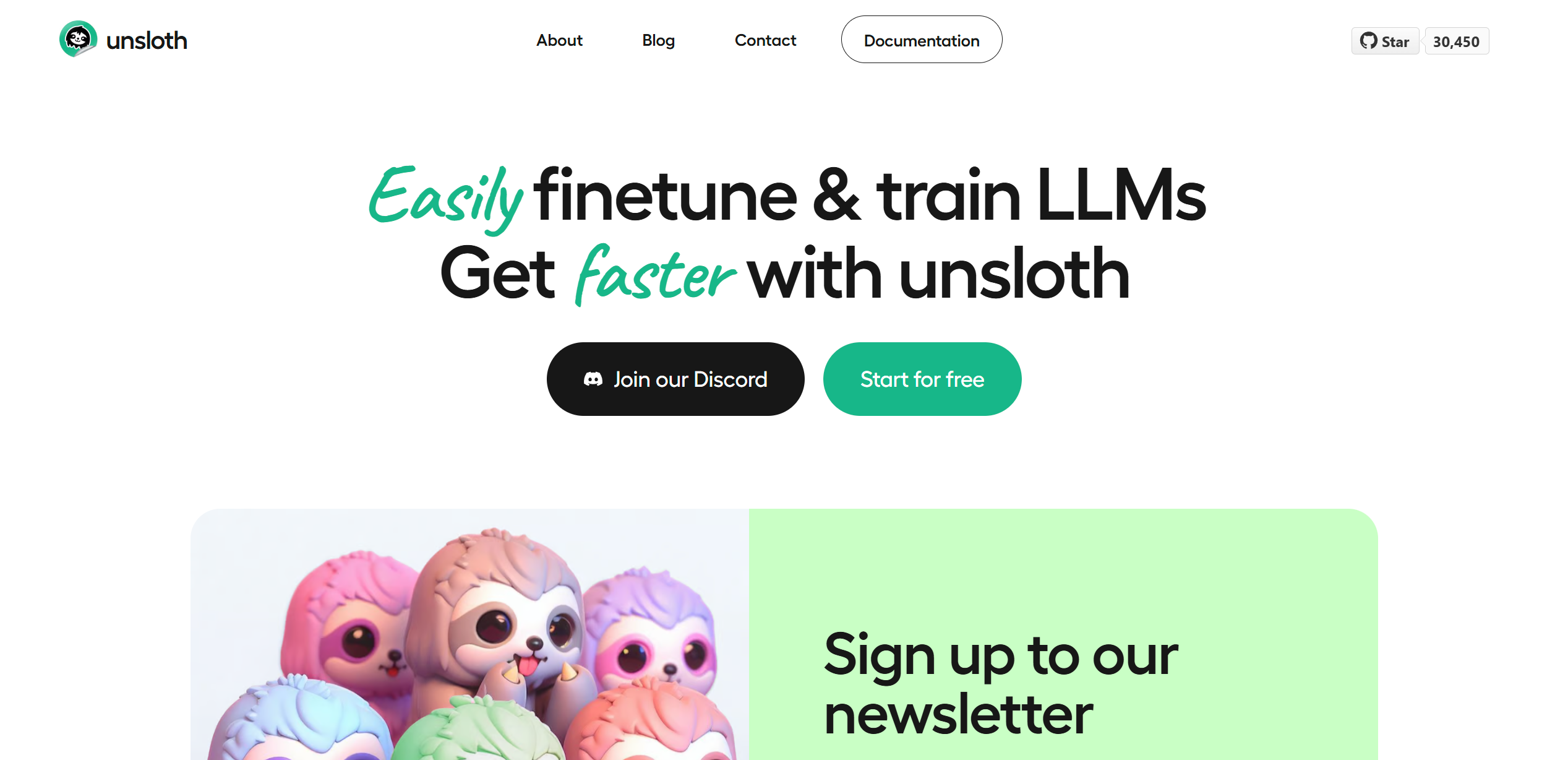
Table of Contents
Overview
In the rapidly evolving landscape of AI, fine-tuning large language models (LLMs) can be a daunting task, often requiring significant computational resources. Enter Unsloth, an open-source framework designed to democratize LLM fine-tuning. Unsloth offers a streamlined and efficient approach, enabling researchers, developers, and even startups to fine-tune powerful models like LLaMA 3, Mistral, and Gemma without breaking the bank. Let’s dive into what makes Unsloth a game-changer.
Key Features
Unsloth boasts a compelling set of features that address the core challenges of LLM fine-tuning:
- Fast Fine-tuning for LLMs: Unsloth is engineered for speed, allowing for significantly faster fine-tuning compared to traditional methods.
- 80% Memory Reduction: By optimizing memory usage, Unsloth enables fine-tuning on hardware with limited resources.
- Supports QLoRA and LoRA: The framework leverages Quantization-Aware LoRA (QLoRA) and Low-Rank Adaptation (LoRA) techniques for efficient parameter updates.
- Free Colab Notebooks: Unsloth provides readily available Colab notebooks, making it incredibly accessible for users to get started without complex setups.
- Open-Source: Being open-source, Unsloth fosters community collaboration and allows for customization and extension.
How It Works
Unsloth’s magic lies in its application of optimization techniques like QLoRA and LoRA. These methods drastically reduce the number of trainable parameters, thereby minimizing memory footprint and accelerating the training process. Users can access Unsloth through its GitHub repository or utilize the provided Colab notebooks. This allows them to fine-tune LLMs on readily available resources, even without access to high-end GPUs. By focusing on efficient parameter updates, Unsloth empowers users to adapt pre-trained models to specific tasks and datasets with minimal computational overhead.
Use Cases
Unsloth’s efficiency and accessibility open up a wide array of applications:
- LLM Research: Researchers can rapidly experiment with different fine-tuning strategies and architectures.
- AI Model Prototyping: Developers can quickly prototype and iterate on AI models for various applications.
- Academic Experimentation: Students and academics can leverage Unsloth for educational purposes and research projects.
- Cost-efficient Model Training: Startups and smaller organizations can fine-tune models without incurring exorbitant compute costs.
- Model Optimization for Startups: Optimize pre-trained models for specific use cases, improving performance and reducing inference costs.
Pros & Cons
Like any tool, Unsloth has its strengths and weaknesses. Let’s break them down:
Advantages
- High Efficiency: Unsloth significantly reduces training time and memory requirements.
- Open-source and Free: The open-source nature makes it accessible to everyone without licensing fees.
- Reduces Compute Costs: Lower memory usage translates to lower GPU costs, making LLM fine-tuning more affordable.
- Accessible with Colab: The Colab integration lowers the barrier to entry, allowing users to get started quickly.
Disadvantages
- Requires Technical Setup: While Colab simplifies things, some technical knowledge is still required for setup and configuration.
- Limited Support for Non-Hugging Face Models: The framework may have limited support for models outside the Hugging Face ecosystem.
How Does It Compare?
When compared to other LLM fine-tuning frameworks, Unsloth stands out in terms of efficiency. For example, Axolotl offers a broader range of features but typically requires significantly more memory. Hugging Face PEFT provides excellent integration with the Hugging Face ecosystem, but its training speed may not match Unsloth’s optimized performance. Unsloth carves its niche by prioritizing speed and memory efficiency, making it an ideal choice for users with limited resources.
Final Thoughts
Unsloth is a valuable addition to the AI toolkit, particularly for those seeking to fine-tune large language models efficiently and affordably. Its open-source nature, coupled with its focus on speed and memory optimization, makes it a compelling option for researchers, developers, and startups alike. While it may require some technical expertise to set up, the benefits in terms of reduced costs and faster training times are well worth the effort. As the AI landscape continues to evolve, tools like Unsloth will play a crucial role in democratizing access to powerful LLMs.

